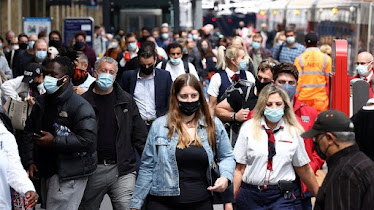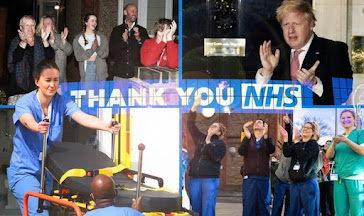The route to Xmas has been turbulent and frenetic, barely pausing for breath while being caught up in a continuously accelerating, carousel of motion and thought! I've found a metaphor of surfing upon a turbulent sea very useful as fighting against the inevitability of systemic change and our attempt to adapt to it, would render us overwhelmed by powerful waves.
So what has all this change been about and why the constant rushing? Of course there are a myriad of reasons, personal as well as societal, for all of us. However some are more manifest than others.
Political change. Both in the UK and abroad, political instability is an ongoing concern. The lurch to the far right is conducive to an intrinsic misanthropy and a deep-seated paranoia. For many the basic appeal is one of pragmatism bringing about change that cuts through bureaucracy and complexity. The problem here is the Far-Right's destabilizing and facetious solutions to complex problems with multifarious causes and effects. The consequences of brutal and inhumane policies could potentially be devastating for those, in particular, who are vulnerable.
The election of a centrist Labour Party in the UK in reaction to an inept and corrupt Tory Party has, unfortunately resulted in a country having to endure an extended wait for change that will be beneficial in an everyday, practical manner.
Developments in IT. I have little desire to labour a point that we are all too aware of, however it's worth noting that the world of computerized representations that we inhabit more and more frequently is destabilized by continuous updates, slowed by a plethora of advertising, buffered by attempts to addict the public and made dangerous by a burgeoning use of disinformation. When you consider the additional complexity of current operating systems it should be no wonder that so many people, intelligent and experienced, struggle to operate them.
Purposeful disinformation via established organizations is concerning and points to a normalizing of utilizing misleading information, designed to alter our perceptions and behaviour. What effect does this have on our perception of reality and how healthy is this?
Concerns about developments in AI are somewhat overblown at present as we try to weigh-up its potential impact and, in doing so, we become more conscious of it. However, the foolishness of developing powerful machines that mimic human thought and behaviour does need to be considered and soon! The potential problems concerning warfare, policing and seamless propaganda should not need elucidation in this short essay.
Arguments that surround computer-based consciousness reveal a problematic conception of IT-based consciousness and a difficulty in construing consciousness from a perception of consciousness. In the future, how can we discern a conscious machine from our perceptions of a conscious machine? What ethical, intellectual and practical issues will arise from this?
Fiscal Uncertainty. Since the 2008 global recession the UK has experienced financial difficulties and uncertainty, that have become deep-seated and our everyday experience. High or Late Capitalism is, essentially the West's response to spiraling costs, economic stagnation and the emerging economies. The power balance has shifted away from the West and "future-proofing" has been rife. It's well reported that as essential services endure cutbacks and people who are classed as "low to middle-income" suffer financial difficulties, a tiny minority are becoming ever more wealthy. Brexit, global phenomena/instability and the COVID legacy are all factors.
We are all grabbing cash as quickly as we can, inhabiting an anxiety-provoking, everyday existence of high costs, stagnant wages, high inflation and dealing with representations of money rather than hard cash. Politeness has been compromised to the point where everyday interactions and behaviour that are conducive to everyday living, have become ever-harder to achieve. The roads have become more dangerous than ever, with seemingly feral drivers mowing pedestrians down and making their own rules. The Government needs to invest in transport police, actively engaging in law enforcement. Don't hold your breath!
Trump's naive and aggressive approach to tariffs on imports to the US are the latest manifestation of fiscal uncertainty. Retaliatory tariffs from other countries are a predictable response that increases global instability. Financial naivety seems de rigeur with Liz Truss's recent disastrous economic policies preceding Trump's current ignorance.
A New World Order. The geo-political, despotic ramblings of Trump, since his return to the White House have further entrenched and expanded the reach of authoritarianism, corruption, chaos and fear. A clear alignment with Putin's policies and an aloofness from Europe and other allies points to a merging of "primary" nations to seek control and power beyond established boundaries. Ideologically opposed nations are moving closer politically to create an elite that can enjoy more power over "lesser" nations. It's clear that the Far-Right is being used to destabilize democracy and established political practice to forge a more direct route to power. Far from political principle and established political ideology, the New World Order is driven by wealth and power, intimidating and threatening "lesser" nations and overthrowing democratic processes. Enabled by the Internet that acts as a destabilizing platform for misinformation and stirring up hatred and mobilizing violence, ideological and cultural differences seem to matter little when there is much power to be gained via fear and propaganda when wealthy and powerful aggressors can unite in a shared cause... An increase of power.
A common theme within this burgeoning New World Order is the taking of land. Admittedly, a very traditional form of gaining more power, but this method has found a new vigor and prevalence. China, Russia and the USA have all invaded other countries or threatened to invade. Trump's threats of taking over Greenland, allies becoming states of the USA and retaking the Panama Canal are the latest manifestations of this idea.
It's interesting to note the shift from Liberalism to Authoritarianism. The rise of the far right has been fundamentally aided by the corruption and incompetence of established political parties; the political malaise that we have experienced for the last 15 years or so has resulted in an attraction to ideology that the holocaust rendered defunct, inherently dangerous and left a black cloud of fear across the globe.
Logistically speaking, the threat of taking land is a costly and dangerous practice that can leave an aggressor weakened. Soft power is often seen as more desirable together with the threat of potential military action to establish power ratios. This lurch towards military intervention can backfire and the appeal of pragmatism may result in protracted warfare, loss of infrastructure for both parties and military/civilian casualties. This would point to a cogent argument for international co-operation and "win-win" scenarios acted out on the global stage. However, the appeal of an apparent pragmatism "to get stuff done" may be perceived as politically appealing and a vehicle to increase power in a very anxious and volatile world. Commonsensically, doing needs to be balanced by potential risks, financially, militarily and the damage to infrastructure to both the aggressor and the victim.
Whether the ignorance and fear of Trump's campaign leads to an incidental peace between Russia and Ukraine or whether we see protracted war on the borders of Asia and Europe remains to be seen. Certainly the wise interventions of European leaders and diplomats will calm the storm that sits between a dangerous dictator and an aspiring dictator.
A Subjective Response: Ultimately, responses to an uncertain world interconnected by unwieldy new technologies, an accelerated rate of change, cultural upheaval, the chronic threat and actuality of war and financial instability are within our own personal control. Evidently, the manifestations of actuality are largely beyond our control but our interpretation of them is within our control. Information overload has, unsurprisingly lead to instability and a reaction of anxiety.
History is full of corrupt and power-hungry leaders that have attempted to increase their power and protect themselves, often through dubious and dangerous means. In fact, the human condition is inherently paradoxical and our perceptions of reality are filtered through the optics of our own biases and limitations. As Rene Magritte articulated so cogently yet profoundly in his painting "The Human Condition" our perception is always intrinsic to our experience and comprehension of the world. As we attempt to free ourselves more completely by utilizing our creativity, our immutable condition remains and limits our comprehension, interpretation and behaviour. As during war we work hard to kill each other we also work hard to tend to the sick. As we develop new technologies to communicate more frequently we invite disinformation and addiction and affect our mental health in negative ways.








































